- Home
- Amish Tripathi
Raavan- Enemy of Aryavarta Page 10
Raavan- Enemy of Aryavarta Read online
Page 10
‘Faster!’ shouted Raavan.
He could see riders racing out of the secondary wharf. Riding up the main road. Up the hill. Towards them. Perhaps Krakachabahu had sensed something was wrong.
‘To the other wharf!’ screeched Akampana. He was riding in the middle of the group. Nervous as a cat on a hot metal roof.
The horses swerved onto the road to the right. It was about a five-minute ride downhill to the wharf. Raavan could see a forward scout rider galloping up the straight road, towards them. Krakachabahu’s man.
Raavan pulled his knife out of its scabbard, took the reins of his horse in his mouth, and focused for a moment. Holding his breath, he flung the blade at the rider. It rammed into the man’s throat. As he fell from his horse, Raavan swerved to the right, riding hard behind his men.
‘Hyaah!’
As they thundered down the road towards the damaged wharf, through the dense forest vegetation, Raavan could see the road more clearly. It was now a straight ride to the wharf, which meant they would be easy targets for Krakachabahu’s mounted archers. And he was right at the back of the line. The first target.
Damn!
Thinking quickly, he yanked the string that crisscrossed his shoulder and pulled the shield tied on his back upwards. He could survive an arrow in his back. Not one that pierced his throat.
The wharf was just a little way ahead. The road was getting narrower. Much of it was taken up by the scaffolding built for port repairs. A few men were on the scaffolding, while others stood around on the road.
The horsemen thundered ahead.
‘Move!’ screamed Mareech, as he hurtled past.
The workers rushed to get out of the way, in a sudden state of panic. One of the more unfortunate ones came under Akampana’s horse. The riders didn’t slow down. The man was run over repeatedly by the many horses that followed Akampana’s. By the time Raavan passed, he had been pummelled to a pulp.
Since there were no posts to tie the ship to, Kumbhakarna had had the sailors drop anchor. Keeping the ship as close as he could to the edge of the wharf, with the help of grappling hooks. The strongest amongst the sailors hung close to the anchor line, a large axe in his hands, ready to strike and cut the thick rope as soon as Raavan and the others were on board.
There was a wide gap between the wharf’s edge and the ship. But the Lankan horses had been trained to jump high and far. Precisely for scenarios where a quick escape was necessary. Such as now.
Mareech did not slow down as he galloped through the damaged wharf.
‘Hyaah!’
He whipped his horse to a frenzy, causing it to gallop harder. Faster and faster. Right at the edge of the wharf, he screamed, ‘DASHA!’
Dasha was the old Sanskrit word for the number ten. Nobody knew why Raavan had insisted on this particular word when the horses were being trained, but his men had obeyed him unquestioningly, as usual.
Mareech’s horse knew the command well, and leapt forward. High and far. He landed neatly onto the ship’s deck. Mareech thundered on for a few feet more, clearing the way for the others behind him.
One after the other, the riders leapt onto the ship. One of Prahast’s Naharin soldiers timed his jump wrong. His horse fell short and dropped into the water. The man banged his head hard against the shipboards, breaking his neck. He died instantly. Nobody stopped to look at him. They had no time.
‘Come on!’ screamed Mareech. He was standing by the balustrade of the ship now, having dismounted from his horse. Prahast came speeding forward, timing his jump perfectly, and landed safely on the ship. Raavan was next. The last of them.
Krakachabahu and his men were closing in. Just two hundred metres away.
‘Come on, Dada!’ screamed Kumbhakarna.
One of Krakachabahu’s archers took his horse’s reins into his mouth, positioned his riding bow in front of his chest, and released an arrow.
It was a lucky shot. At a fast-moving target.
The arrow slammed into the horse’s digital flexor tendons on the lower part of his right hind leg. Severing it cleanly. It didn’t seem like a big wound. There was hardly any blood. But it was debilitating for the galloping beast. The right leg, useless and incapable of bearing weight, collapsed. And the horse, because of the fearsome speed it was moving at, fell hard, its head hitting the ground, its neck twisting at an unnatural angle.
Raavan, alert as ever, had already untangled himself from the stirrups. Smoothly dismounting as the horse fell to the ground, he rolled away from it and was back on his feet almost instantly. He ran forward in the same smooth motion.
‘Dada!’ Kumbhakarna’s voice was filled with anxiety and fear.
Everyone around him had the same thought.
Raavan is not going to make it.
Mareech looked at Kumbhakarna and then back at Raavan. ‘Lord Rudra be merciful…’
There was no way a man could jump over the gap that most of the horses had strained to bridge.
But this was no ordinary man. This was Raavan.
He sprinted down the wharf. Dashing ahead, towards the edge. Towards the port crane meant for loading cargo on ships. It hadn’t been used in months. It was about to be put to use in an unexpected way.
Krakachabahu’s men were still raining arrows at him. Some flew past Raavan. Others missed him by a whisker. But none hit their target.
As he neared the edge of the wharf, Raavan leapt high and grabbed the hook block of the crane. One leg scissored out to kick the winch. His timing was perfect. The winch wound out quickly, allowing the hoist rope to spool out. Holding on to the hook, Raavan soared over the water, towards the ship, as arrows flew around him.
Kumbhakarna and the rest of the crew stood rooted to their spots. Transfixed by this adrenaline-charged display of athleticism.
As soon as he was at a suitable height, Raavan gathered momentum, swung his body forward, and let go of the hook. He soared high in the air, then dropped easily onto the ship’s deck. He rolled smoothly to break his fall and was back on his feet immediately.
His men stood around him, awestruck. Silent.
‘Let’s go!’ Raavan shouted.
Kumbhakarna turned to the man at the anchor rope. ‘Cut it!’
The sailor swung the axe, and in one mighty blow, severed the thick rope. The grappling hooks were rapidly released.
‘Row now! Quickly!’ ordered Kumbhakarna.
On command, the pace setters in the galley deck below started beating their drums. The men began rowing in tandem. The ship lumbered ahead. Pulling out of the wharf.
Krakachabahu’s men continued to shoot arrows at them.
‘Get down!’ shouted Raavan.
The men went down on their knees, taking cover behind the balustrades.
‘Faster!’ ordered Kumbhakarna. The pace setters pounded up the beat and the rowers picked up their pace.
‘Unfurl sails!’
One of the sailors, who had been hiding behind the tabernacle, started turning the winch. This was an engineering innovation that Raavan had perfected. It allowed one of the sails to be unfurled rapidly, with the guidance of a winch rigged on the deck. The sail started spreading out quickly. It would catch the wind soon.
As the ship pulled away, Raavan could hear the angry shouts of Krakachabahu’s men in the distance. Safe behind the balustrade, he looked at Kumbhakarna and grinned.
Mareech clapped Raavan on the shoulder. ‘We’ve done it, Raavan! We’ve done it!’
Raavan smiled. He rose to his feet and made an obscene gesture at Krakachabahu’s men in the distance. One of the Naharins shot an arrow that whizzed past his face.
Mareech pulled his nephew down. ‘What are you doing? We are not out of danger yet. Stay down!’
Raavan’s face was pale, his body strangely still.
‘Dada?’ Kumbhakarna said worriedly, feeling Raavan’s body for any wounds.
Raavan pushed Kumbhakarna aside and rose to his feet. His gaze was directed at the workers who w
ere cowering near the scaffolding. Another arrow whizzed by. But Raavan didn’t duck.
Mareech pulled him down again. ‘What is wrong with you? Stay down!’
Raavan fell back on the deck unsteadily. He looked like he had seen a ghost. His breathing was ragged. He pushed Mareech away and rose again.
This time an arrow hit him on the shoulder, slamming into him with brutal force. But Raavan didn’t flinch. His eyes were glued to the scaffolding.
‘Dada!’ Kumbhakarna screamed in panic, pulling him down again.
He noticed the sudden tears in his elder brother’s eyes.
‘Ka…’ Raavan was crying. ‘Kanya…’
This time, Kumbhakarna rose. He narrowed his eyes and looked towards the fast receding shore. At the scaffolding. At the workers there. At one person in particular, standing in the centre.
It was her.
He recognised her from the paintings.
While everyone else was cowering, she stood there unmoving. Upright. Like the living Goddess that she was. The signs of hard physical labour marked her and yet her face was luminous. She watched the ship go, her expression stately and calm. She radiated a quiet dignity. Almost like she was willing them to stop the violence. With her moral force.
There could be no doubt. It was her.
Mareech reached out and pulled Kumbhakarna down as another arrow whizzed by. He shouted angrily at his nephews, ‘What has gotten into you both?’
Kumbhakarna looked at Raavan. He said what Raavan couldn’t find the strength to say. ‘The Kanyakumari…’
As if energised by the divine word, Raavan broke the shaft of the arrow buried in his shoulder. He stood up again and turned around. Ready to jump into the lake. Ready to swim to her.
‘Raavan!’ screamed Mareech, grabbing his nephew. ‘Stop this madness!’
‘Let me go!’ Raavan cried hoarsely, struggling to free himself. ‘Let me go!’
Everyone on the ship stared at their leader. Wondering what was going on.
Kumbhakarna held Raavan tight. ‘Dada, you can’t go back now! You will be killed!’
‘Let me go!’ Raavan tried to push the others away and get to his feet.
‘Dada! Listen to me, please. You will die before you reach her!’
‘Let me go!’
‘I will come back for her, Dada! I will find her!’
‘Let me go!’ Raavan repeated in desperation.
Mareech was too stunned to react. He had never seen Raavan like this.
‘Dada!’ Kumbhakarna wouldn’t let go of his brother. ‘Please, trust me. I’ll come back for her. I’ll find her. I give you my word. But right now, you need to stay with us.’
‘Let me go.’ Raavan’s voice was ragged. Broken.
‘Dada, I will find her. I promise.’
‘Let me go…’
The mast unfurled completely and caught the wind. The ship sailed out and away from the shore. Away from Krakachabahu’s arrows.
Away from her.
Away from the Kanyakumari.
‘Let me go…’
Chapter 9
In a little less than a month, Kumbhakarna was back in Kalinga. After the daring robbery on Nalaban Island, they had sailed to Lanka in a sombre mood. They had reached Gokarna in a day and a half, and the precious merchandise had been quickly unloaded and stored in the basement of Raavan’s mansion, in a specially built and well-guarded chamber, with multiple locks for additional security. Kumbhakarna had immediately set about preparing for his journey back to the island. He had purchased a new ship, one that could not be traced back to Raavan in any way. He had also hired a small crew of young men from southern Africa. All of this had been accomplished in three weeks.
Then Kumbhakarna set off again, sailing up north. Towards Chilika lake. Towards the Kanyakumari.
By now, news had got around that a band of Naharins who had planned to follow the governor of Chilika into rebellion had double-crossed him and taken him prisoner. They had sailed out to Nahar with the captive Krakachabahu, intending to hand him over to the king. When a rebellion fails, it is pragmatic for the rebels to betray their leader to the incumbent ruler and save at least their own hides. Without the money that Krakachabahu had amassed over the years, the Nahar rebellion was as good as dead.
Nevertheless, sailing directly into the lake would have been risky, Kumbhakarna knew. He may be young, but he was not rash. There could still be some loyalists of Krakachabahu in Chilika.
So, Kumbhakarna sailed up north, beyond Chilika, intending to enter Kalinga via the mouth of the Mahanadi. But on the way, he decided to stop at the famous Jagannath temple in Puri, which lay between the lake in the south and the river to the north.
The Jagannath temple was considered to be one of the holiest spots in India. It was close to the coast and clearly visible from the sea. Kumbhakarna anchored his ship and then set out on a rowboat to the shore, accompanied by ten African guards.
The temple complex, consisting of thirty temples, was built on an enormous stone platform spread over ten acres. The central temple, one of the tallest and largest in India, was the Jagannath temple; a shrine dedicated to the Lord of the Universe. The Vishnu. The Vishnu before all other Vishnus. The Vishnu who was the Witness. The Saakshin.
Unlike most idols in temples, which were made of stone or metal, the Jagannath idol was made of wood. The wood of a neem tree, to be precise. Every twelve years, it was replaced with a freshly carved one.
The dark idol had a massive head, emerging directly from the chest, without a discernible neck. The arms were in line with the upper lip. The eyes were large and round. The waist was where the form ended. No legs. No hands.
The Saakshin Vishnu was, strictly speaking, a witness. The rich black colour, krishna in old Sanskrit, was testimony to its provenance, that this God hailed from before the beginning of time. Before even light was created. For before light was created, all was dark. All was black.
The absence of hands signified that He would not enact any karma of His own. The absence of legs showed that He would not move, either towards you or away from you. He was neutral. He would take no sides in petty human rivalries. He was beyond personal likes and dislikes.
Some believed that it was inaccurate to even assign a gender to the God. He was beyond such petty divisions. He was unity. The source.
Most importantly, He had no eyelids. His eyes were forever open. He was always watching.
According to the ancients, this was the highest form of divinity that humans were capable of understanding. For the Saakshin Vishnu was the Primal Being. Floating through time. Witnessing it all, as people lived their lives and the universe breathed its karma.
The prayers that were offered to Him were also unusual.
Devotees did not go to the Jagannath temple to merely ask for His blessings. They went with a larger purpose, when they were ready to carry out their paramount karma. To ensure that it was recorded in the memory of the Primal Being. The account of their karma in the Saakshin Vishnu’s memory would decide whether the devotee would get freedom from the cycle of birth and rebirth.
Kumbhakarna believed that he was about to embark on the greatest karma of his life. He went down on his knees in front of the great idol. His back bent. His head touching the floor. Chanting. At long last, he rose and said what every devotee of the Saakshin Vishnu said when facing Him: ‘Witness me, My Lord.’
Witness me as I carry out the greatest karma of my life.
It had been three years since the Nalaban Island robbery. Twenty-two-year-old Raavan had become reclusive and rarely ventured out of Gokarna. While he was still involved in the business and made the decisions on all key strategic issues, he did not go out to sea or travel. He remained in Gokarna, watching the sea from the heights of his hilltop mansion. Waiting for Kumbhakarna.
All this time, Kumbhakarna had been sending regular updates from Kalinga. The dock-repair workers they had seen the Kanyakumari with had travelled westward, deeper into the he
art of Kalinga. The next time Raavan heard from Kumbhakarna, it was with the news that they were encamped at Vaidyanath, close to the Mayurakshi River. It wasn’t too far from Kalinga.
In the meantime, Mareech had started managing Raavan’s vast business empire. He had used the money looted from Krakachabahu to commission the building of large new ships. The best ship-builders in Gokarna and across the land had their entire capacity blocked by Raavan’s purchase orders. He was taking delivery of five or six ships every month; an unprecedented happening that shocked the trading community all across the Indian Ocean rim.
Gradually, Raavan built up a fleet of two hundred ships. An advance payment for the cave material had been made to the Malayaputras. Raavan’s men took each new ship, as soon as it was delivered, to Unawatuna, a hidden alcove on the southern coast of Lanka. They careened the ships there. The cave material was then kneaded, mixed with other ingredients, and painstakingly rubbed on to each ship’s hull. It was a long and laborious process. And done in secret by a small, loyal crew that was very well rewarded for its efforts.
As Raavan’s fleet grew, so did its reputation for speedy travel. Manufacturers and artisans found it profitable to trade with him. They knew that their goods would be delivered and sold much faster if they went to Raavan, as compared to other traders. On Raavan’s instructions, Mareech also began to use their vastly superior fleet to apprehend and loot other ships along the busy trade routes of the Indian Ocean. The pirate vessels would appear like the wind, plunder and kill the sailors on the target ships, and sink them to ensure that no trace was left of their crimes. Many of the ships they destroyed belonged to Kubaer. Because of the lack of witnesses, no one made the connection with Raavan. They believed the attacks to be the handiwork of pirates.

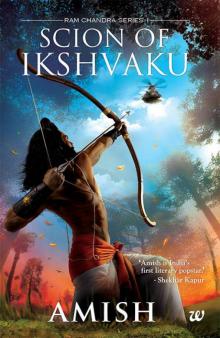 Scion of Ikshvaku
Scion of Ikshvaku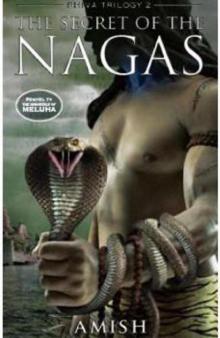 The Secret of the Nagas
The Secret of the Nagas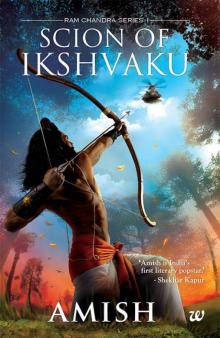 Scion of Ikshvaku (Ram Chandra Series) FlyLeaf.ORG
Scion of Ikshvaku (Ram Chandra Series) FlyLeaf.ORG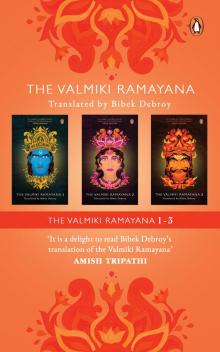 The Valmiki Ramayana
The Valmiki Ramayana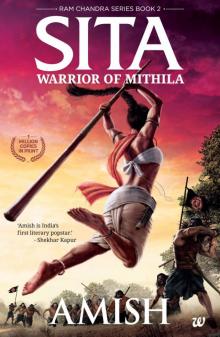 Sita: Warrior of Mithila
Sita: Warrior of Mithila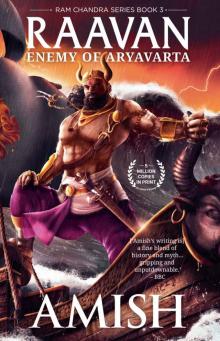 Raavan- Enemy of Aryavarta
Raavan- Enemy of Aryavarta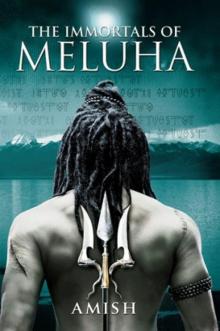 Immortals of Meluha
Immortals of Meluha